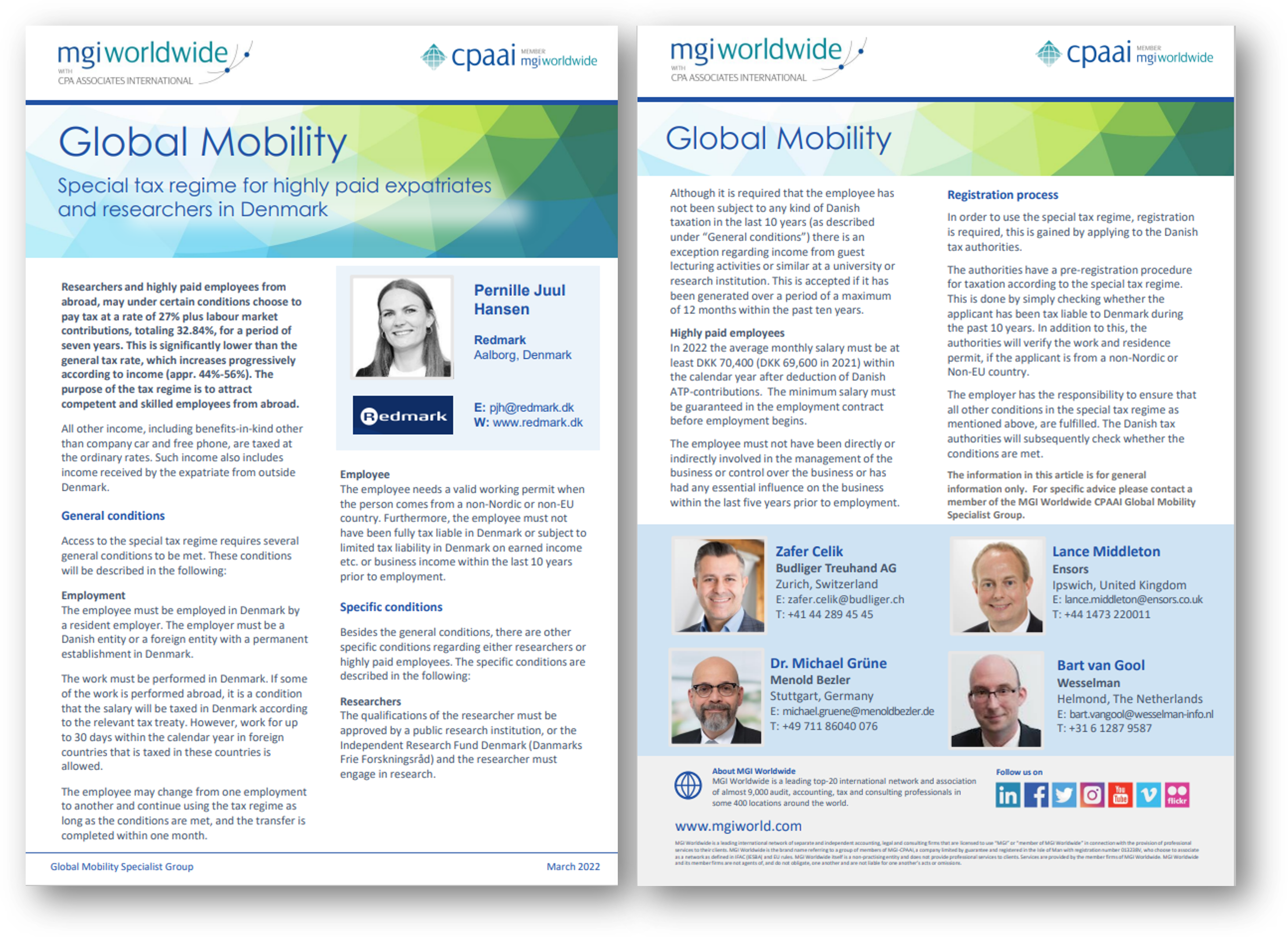Highly paid expatriates and researchers benefit from a special tax regime in Denmark
Pernille Juul Hansen, Tax Consultant at MGI Worldwide accounting network member firm Redmark, based in Aarhus, Denmark, comments on the special tax regime offered by the Danish government to highly paid inbound expatriates and researchers recruited from abroad.
Researchers and highly paid employees from abroad, may under certain conditions choose to pay tax at a rate of 27% plus labour market contributions, totaling 32.84%, for a period of seven years. This is significantly lower than the general tax rate, which increases progressively according to income (appr. 44%-56%). The purpose of the tax regime is to attract competent and skilled employees from abroad.
All other income, including benefits-in-kind other than company car and free phone, are taxed at the ordinary rates. Such income also includes income received by the expatriate from outside Denmark.
General conditions
Access to the special tax regime requires several general conditions to be met. These conditions will be described in the following:
Employment
The employee must be employed in Denmark by a resident employer. The employer must be a Danish entity or a foreign entity with a permanent establishment in Denmark.
The work must be performed in Denmark. If some of the work is performed abroad, it is a condition that the salary will be taxed in Denmark according to the relevant tax treaty. However, work for up to 30 days within the calendar year in foreign countries that is taxed in these countries is allowed.
The employee may change from one employment to another and continue using the tax regime as long as the conditions are met, and the transfer is completed within one month.
Employee
The employee needs a valid working permit when the person comes from a non-Nordic or non-EU country. Furthermore, the employee must not have been fully tax liable in Denmark or subject to limited tax liability in Denmark on earned income etc. or business income within the last 10 years prior to employment.
Specific conditions
Besides the general conditions, there are other specific conditions regarding either researchers or highly paid employees. The specific conditions are described in the following:
Researchers
The qualifications of the researcher must be approved by a public research institution, or the Independent Research Fund Denmark (Danmarks Frie Forskningsråd) and the researcher must engage in research.
Although it is required that the employee has not been subject to any kind of Danish taxation in the last 10 years (as described under “General conditions”) there is an exception regarding income from guest lecturing activities or similar at a university or research institution. This is accepted if it has been generated over a period of a maximum of 12 months within the past ten years.
Highly paid employees
In 2022 the average monthly salary must be at least DKK 70,400 (DKK 69,600 in 2021) within the calendar year after deduction of Danish ATP-contributions. The minimum salary must be guaranteed in the employment contract before employment begins.
The employee must not have been directly or indirectly involved in the management of the business or control over the business or has had any essential influence on the business within the last five years prior to employment.
Registration process
In order to use the special tax regime, registration is required, this is gained by applying to the Danish tax authorities.
The authorities have a pre-registration procedure for taxation according to the special tax regime. This is done by simply checking whether the applicant has been tax liable to Denmark during the past 10 years. In addition to this, the authorities will verify the work and residence permit, if the applicant is from a non-Nordic or Non-EU country.
The employer has the responsibility to ensure that all other conditions in the special tax regime as mentioned above, are fulfilled. The Danish tax authorities will subsequently check whether the conditions are met.
Download the full article HERE
The information in this article is for general information only. For specific advice please contact a member of the MGI Worldwide CPAAI Global Mobility Specialist Group.
For more information visit the Redmark website here or view their firm profile here.
MGI Worldwide with CPAAI, is a top 20 ranked global accounting network and association with almost 9,000 professionals, accountants and tax experts in some 400 locations in over 100 countries around the world.

